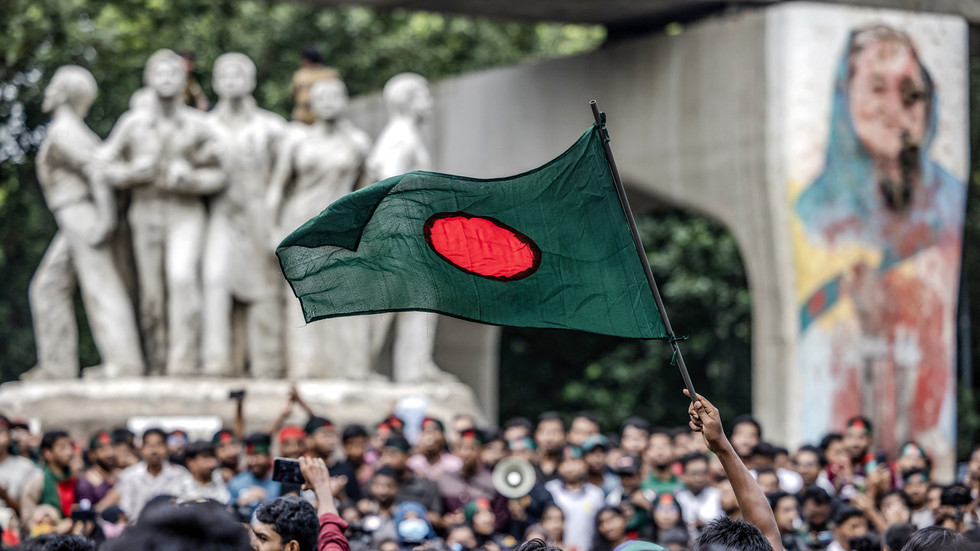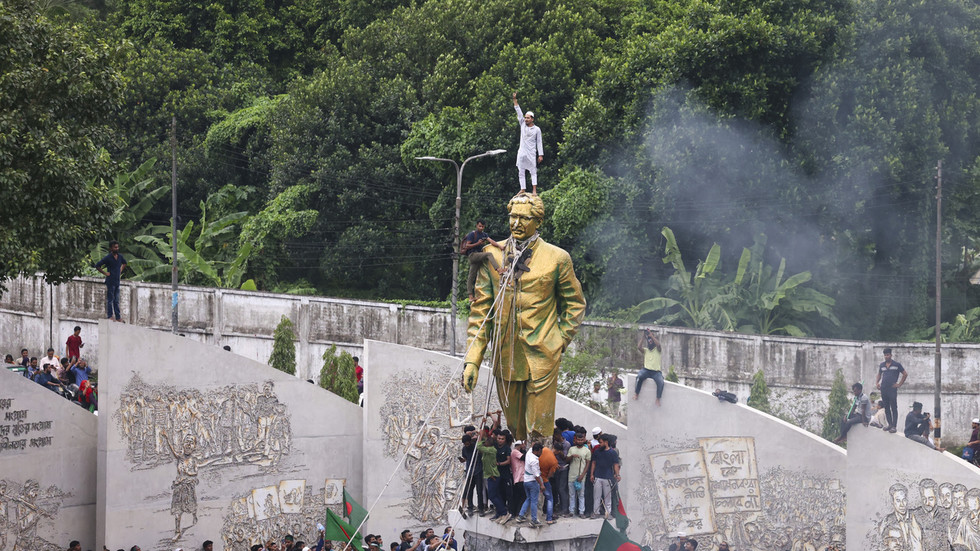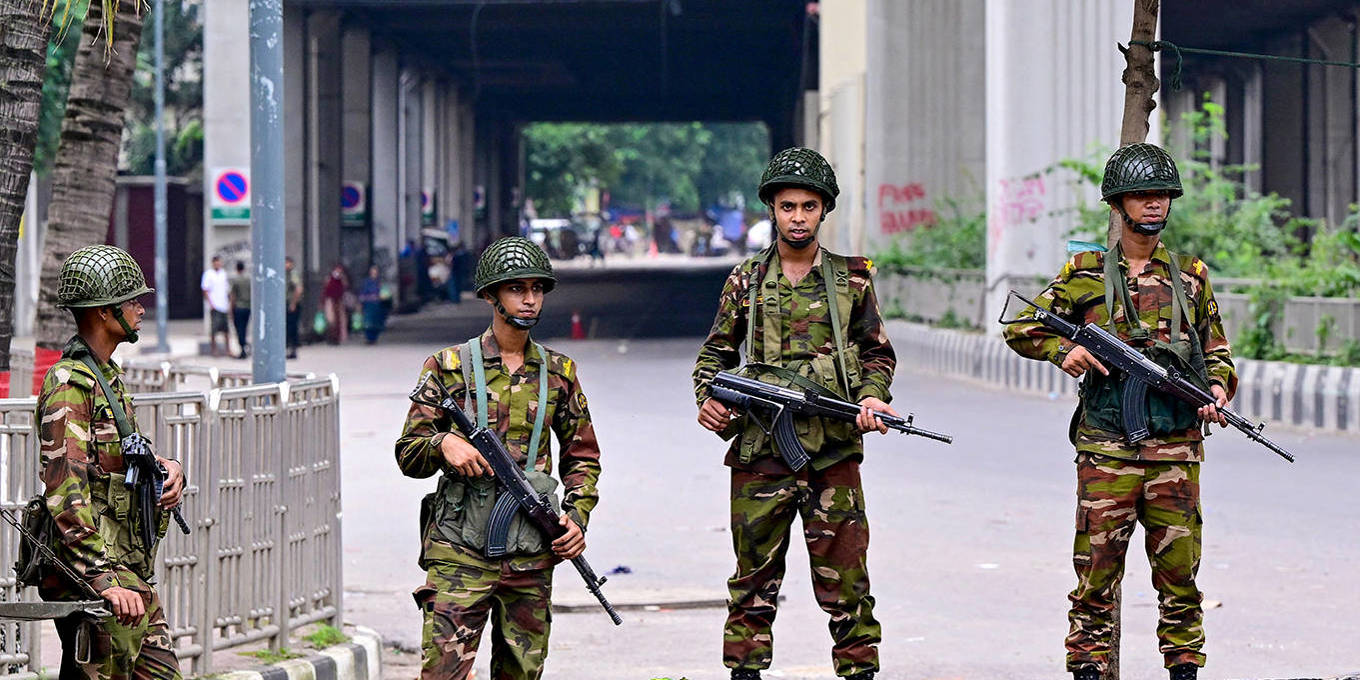MNZGamerX
Full Member
- Dec 12, 2023
- 122
- 68
- Country of Origin

- Country of Residence

by Brahma Chellaney
Many media accounts have credited the toppling of Bangladesh Prime Minister Sheikh Hasina’s government almost entirely to a student-led uprising. Unmentioned are either the army’s role in the overthrow, including packing the “Iron Lady” off to India, or the military’s return as the final arbiter in Bangladeshi national politics.
In reality, the regime change in the world’s eighth most-populous country amounts to a quiet military coup behind a civilian facade.
By installing an interim civilian government made up of only “advisers,” the coup leaders have not only forestalled U.S.-led sanctions but also helped foster a romanticized Western media narrative of a student-led “revolution” in the country.
The appointment of Muhammad Yunus as the “chief adviser,” or the head of the interim administration, has only helped mask military rule. The 84-year-old Yunus, a longtime friend of Bill and Hillary Clinton, received the 2006 Nobel Peace Prize for pioneering microcredit, or giving small loans to rural families to help alleviate poverty.
With the duration and scope of powers of the interim administration undefined, its advisers work essentially at the direction of the military brass, especially the army chief, Gen. Waker-uz-Zaman, the power behind the throne. The advisers include two students who led the protests, a hardline Islamist leader and two retired army generals, one of them tasked with restoring law and order in the country.
To be clear, violent student-led, Islamist-backed protests against Hasina’s 15-year secular but increasingly undemocratic reign helped force her out of office. But the decisive factor that ended her rule was loss of support from the country’s powerful army. With protesters rampaging through the streets of the capital of Dhaka, the army’s refusal to enforce a government-ordered lockdown put Hasina’s own personal safety at risk, allowing the military to prevail upon her to flee the country.
No sooner had the 76-year-old Hasina departed for India aboard a military transport plane than mobs ransacked the prime minister’s sprawling official residence, looting every item that could be carried away, from paintings and furniture to fish from the pond.
Driving Hasina into exile appears not to have been a spur-of-the-moment military decision, but rather central to a well-thought-out plan for an indirect army takeover of the country. The international costs of killing a sitting prime minister in a coup, or putting her in prison without due process, were considered too high, making her forced banishment a better choice for the military brass.
Bangladesh’s decades-old cycle of political violence, after all, began with the predawn murder of Hasina’s father, the country’s charismatic founding leader, Sheikh Mujibur Rahman, in a 1975 army coup. President Rahman, was killed by army officers in cold blood — along with his wife, three sons and their wives — while they were asleep at Rahman’s residence. Hasina, just 28 years old then, survived because she was abroad at that time.
What followed was prolonged political turmoil that prevented democracy from taking root. Coups and countercoups resulted in extended periods of military rule in the world’s most densely populated large country.
Bangladesh has no regional adversary, yet it has maintained a relatively large military with more than 200,000 personnel. Since external defense is not a major responsibility, the military has long pursued political machinations. When not ruling directly, it has sought to wield political power through pliant civilian-led governments.
Hasina kept the military and Islamist militancy in check, until the army chief used the student-led uprising to engineer her ouster by letting mob violence go beyond the control of police and paramilitary forces. Hasina had appointed Zaman as the army chief just weeks before her downfall, taking comfort in the fact that the general was married to her cousin.
Hasina’s fall, however, triggered a near-total collapse of the state, leading to widespread looting, vandalism, revenge killings and systematic attacks on the country’s small and long-persecuted Hindu minority. But with the mission accomplished by Hasina’s departure, the army chief finally pressed his troops into action to control the situation, including letting them fire on rioting protesters.
With its focus on profit and power, the military has a long history of abuses, as well as a nexus with radical Islamists. And like the military in Pakistan, from which Bangladesh seceded in 1971 after up to three million Bengalis died in a Pakistani genocide, the Bangladeshi armed forces maintain extensive commercial business interests, extending from real estate and hotels to banking, manufacturing and shipbuilding.
After this month’s silent coup, not only will democratization become more difficult, but already-weak civilian oversight over the military could evaporate.
Yet, with a U.S.-friendly interim administration having replaced the Hasina government, which the Biden administration openly targeted over democratic backsliding, Washington has little reason to impose coup-related aid restrictions on Bangladesh.
More than two dozen coups have occurred across the world since 2009, but the U.S. failed to formally condemn about half of those military takeovers because it saw them as favorable to American interests. Washington usually calls out a coup — an action legally necessitating a cutoff of U.S. foreign assistance — when the takeover is detrimental to American power and influence in the region.
Over the years, the U.S. has maintained cozy ties with military or military-backed regimes in Bangladesh. And it views the latest regime change as a positive development. But the White House and the State Department have denied Hasina’s allegation of U.S. involvement in her overthrow.
Still, with purges and crackdowns in full swing even as the nation remains in disarray, Bangladesh faces the daunting task of restoring the rule of law and reviving an economy battered by large-scale mob violence and destruction.
Many media accounts have credited the toppling of Bangladesh Prime Minister Sheikh Hasina’s government almost entirely to a student-led uprising. Unmentioned are either the army’s role in the overthrow, including packing the “Iron Lady” off to India, or the military’s return as the final arbiter in Bangladeshi national politics.
In reality, the regime change in the world’s eighth most-populous country amounts to a quiet military coup behind a civilian facade.
By installing an interim civilian government made up of only “advisers,” the coup leaders have not only forestalled U.S.-led sanctions but also helped foster a romanticized Western media narrative of a student-led “revolution” in the country.
The appointment of Muhammad Yunus as the “chief adviser,” or the head of the interim administration, has only helped mask military rule. The 84-year-old Yunus, a longtime friend of Bill and Hillary Clinton, received the 2006 Nobel Peace Prize for pioneering microcredit, or giving small loans to rural families to help alleviate poverty.
With the duration and scope of powers of the interim administration undefined, its advisers work essentially at the direction of the military brass, especially the army chief, Gen. Waker-uz-Zaman, the power behind the throne. The advisers include two students who led the protests, a hardline Islamist leader and two retired army generals, one of them tasked with restoring law and order in the country.
To be clear, violent student-led, Islamist-backed protests against Hasina’s 15-year secular but increasingly undemocratic reign helped force her out of office. But the decisive factor that ended her rule was loss of support from the country’s powerful army. With protesters rampaging through the streets of the capital of Dhaka, the army’s refusal to enforce a government-ordered lockdown put Hasina’s own personal safety at risk, allowing the military to prevail upon her to flee the country.
No sooner had the 76-year-old Hasina departed for India aboard a military transport plane than mobs ransacked the prime minister’s sprawling official residence, looting every item that could be carried away, from paintings and furniture to fish from the pond.
Driving Hasina into exile appears not to have been a spur-of-the-moment military decision, but rather central to a well-thought-out plan for an indirect army takeover of the country. The international costs of killing a sitting prime minister in a coup, or putting her in prison without due process, were considered too high, making her forced banishment a better choice for the military brass.
Bangladesh’s decades-old cycle of political violence, after all, began with the predawn murder of Hasina’s father, the country’s charismatic founding leader, Sheikh Mujibur Rahman, in a 1975 army coup. President Rahman, was killed by army officers in cold blood — along with his wife, three sons and their wives — while they were asleep at Rahman’s residence. Hasina, just 28 years old then, survived because she was abroad at that time.
What followed was prolonged political turmoil that prevented democracy from taking root. Coups and countercoups resulted in extended periods of military rule in the world’s most densely populated large country.
Bangladesh has no regional adversary, yet it has maintained a relatively large military with more than 200,000 personnel. Since external defense is not a major responsibility, the military has long pursued political machinations. When not ruling directly, it has sought to wield political power through pliant civilian-led governments.
Hasina kept the military and Islamist militancy in check, until the army chief used the student-led uprising to engineer her ouster by letting mob violence go beyond the control of police and paramilitary forces. Hasina had appointed Zaman as the army chief just weeks before her downfall, taking comfort in the fact that the general was married to her cousin.
Hasina’s fall, however, triggered a near-total collapse of the state, leading to widespread looting, vandalism, revenge killings and systematic attacks on the country’s small and long-persecuted Hindu minority. But with the mission accomplished by Hasina’s departure, the army chief finally pressed his troops into action to control the situation, including letting them fire on rioting protesters.
With its focus on profit and power, the military has a long history of abuses, as well as a nexus with radical Islamists. And like the military in Pakistan, from which Bangladesh seceded in 1971 after up to three million Bengalis died in a Pakistani genocide, the Bangladeshi armed forces maintain extensive commercial business interests, extending from real estate and hotels to banking, manufacturing and shipbuilding.
After this month’s silent coup, not only will democratization become more difficult, but already-weak civilian oversight over the military could evaporate.
Yet, with a U.S.-friendly interim administration having replaced the Hasina government, which the Biden administration openly targeted over democratic backsliding, Washington has little reason to impose coup-related aid restrictions on Bangladesh.
More than two dozen coups have occurred across the world since 2009, but the U.S. failed to formally condemn about half of those military takeovers because it saw them as favorable to American interests. Washington usually calls out a coup — an action legally necessitating a cutoff of U.S. foreign assistance — when the takeover is detrimental to American power and influence in the region.
Over the years, the U.S. has maintained cozy ties with military or military-backed regimes in Bangladesh. And it views the latest regime change as a positive development. But the White House and the State Department have denied Hasina’s allegation of U.S. involvement in her overthrow.
Still, with purges and crackdowns in full swing even as the nation remains in disarray, Bangladesh faces the daunting task of restoring the rule of law and reviving an economy battered by large-scale mob violence and destruction.








